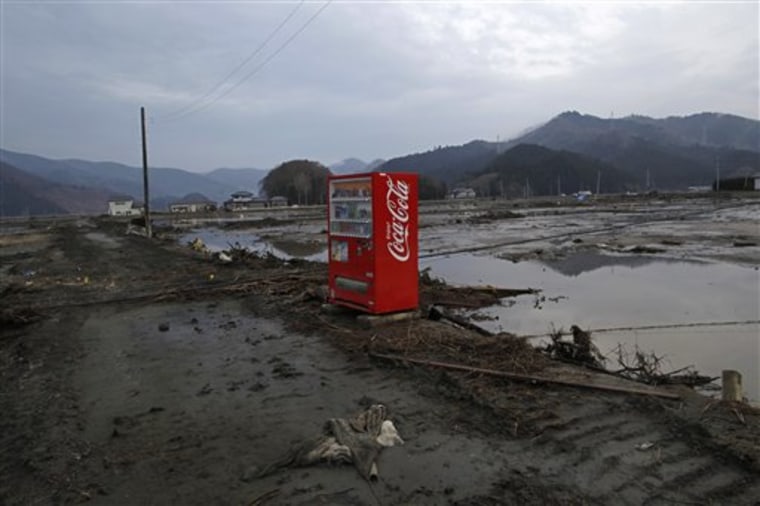Japan hopes to stop pumping radioactive water into the sea Sunday, which should help ease concerns in neighboring China and South Korea over the spread of radiation from the worst nuclear crisis since Chernobyl.
But problems in restoring cooling systems at Japan's crippled nuclear plant, hit by a tsunami on March 11, mean more contaminated water may eventually be pumped into the sea if the complex again runs out of storage capacity.
Japan is struggling to regain control of the Fukushima Dai-ichi nuclear plant after a massive earthquake and tsunami devastated its northeast on March 11, and is facing a major humanitarian and economic crisis.
"There are still numerous aftershocks and there is no room for complacency regarding the situation (at Fukushima Dai-ichi)," Japan's Deputy Cabinet Secretary Tetsuro Fukuyama said.
Plant operator Tokyo Electric Power Co. (TEPCO) said it was continuing to inject nitrogen into reactors to prevent another hydrogen explosion which would spread highly radioactive material into the air.
China and South Korea have criticized Japan's handling of the nuclear crisis, with Seoul calling it incompetent, reflecting growing international unease over the month-long atomic disaster and the spread of radiation.
Anti-nuclear protests
In Tokyo, around 5,000 people took to the streets in two separate anti-nuclear protests Sunday. Some carried placards reading 'No More Fukushima' and 'No Nukes'; others danced and played musical instruments. One group of demonstrators marched to TEPCO's offices.
TEPCO apologized Saturday for the crisis.
"I would like to apologize from my heart over the worries and troubles we are causing for society due to the release of radiological materials into the atmosphere and seawater," Sakae Muto, a TEPCO vice president, told a news conference.
Japanese voting in local elections Sunday are expected to vent their anger over Prime Minister Naoto Kan's handling of the nuclear crisis, further weakening him and bolstering opponents who will try force his resignation once the crisis ends.
The unpopular Kan was already under pressure to step down before the worst disaster to hit Japan since World War Two, but analysts say he is unlikely to be dumped during the nuclear crisis, which is set to drag on for months.
Kan paid another visit to Japan's tsunami-devastated coast Sunday, promising officials in a fishing-dependent city that his government will do whatever it can to help.
Kan visited Ishinomaki, a coastal city of 163,000 people in Miyagi, one of the prefectures (states) hardest hit by the March 11 earthquake and tsunami that killed as many as 25,000 people, destroyed miles of coastline and left tens of thousands homeless.
"The government will do its utmost to help you," Kan, dressed in blue work clothes, told local people gathered near the sea. "We will support you so that you can resume fishing."
Slow recoveryIshinomaki Mayor Hiroshi Kameyama told him the government needs to quickly build temporary homes for the 17,000 city residents who lost theirs and are living in shelters. More than 2,600 people from Ishinomaki were killed in the disaster and another 2,800 are missing. Boats were also destroyed, crippling the fishing industry that accounts for 40 percent of the city's economy.
Meanwhile, 250,000 households in northern Japan were still without running water and electricity Sunday. Some have not had it since the tsunami, while others lost it in a magnitude-7.1 aftershock Thursday that killed three people and rattled nerves, but did not cause extensive damage.
While Kan was visiting Ishinomaki, Japanese and U.S. troops fanned out along the coast in another all-out search for bodies by land, air and sea.
Television news showed them using heavy equipment to lift a boat washed inland by the tsunami so they could search a crushed car underneath. No one was inside.
"A month after the earthquake and tsunami, many people are still missing," said Japanese defense ministry spokesman Norikazu Muratani. "We would like to do our utmost to find bodies for their families."
Only 13,000 deaths have been confirmed so far, and many bodies have likely washed out to sea and will never be found.
A similar three-day search with even more troops a week ago found just 70 bodies, underscoring the difficulties of locating victims in the ocean and the debris along the coast.
In coastal Fukushima on Sunday, a middle-aged man watched as soldiers in scuba gear dove underwater. He hoped they would locate his younger brother, a fisherman who was swept away.
"He must be trapped in the boat," the man told public broadcaster NHK, which did not identify him. "I'm just praying soldiers will find him."
